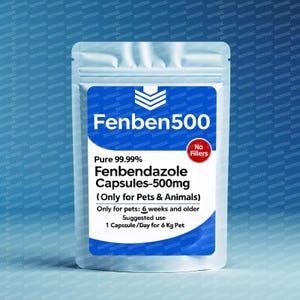fenbendazole: Dosage Guidelines Every Owner Should Know
Understanding the Perks and Uses of Fenbendazole in Vet Medicine
Fenbendazole has developed itself as a vital anthelmintic in veterinary medication. Its capability to target numerous parasitical infections makes it a useful device for vets. The drug's system interferes with essential mobile processes in bloodsuckers, leading to efficient therapy end results. However, its security account differs in between types, necessitating cautious factor to consider in its usage. Recognizing these dynamics can clarify fenbendazole's more comprehensive implications in veterinary treatment and continuous study right into its potential beyond conventional applications
System of Action of Fenbendazole

Typical Parasitic Infections Dealt With With Fenbendazole
A range of parasitical infections are properly treated with fenbendazole, making it a versatile alternative in veterinary medication. This anthelmintic agent is specifically efficient against nematodes, including roundworms and hookworms, which commonly impact canines and cats. It is also used for the therapy of cestodes, such as tapeworms, offering a wide range of activity versus both kinds of digestive tract bloodsuckers. In addition, fenbendazole is helpful in managing infections triggered by protozoa, particularly Giardia, which can bring about stomach distress in animals. Its efficiency encompasses dealing with particular lungworms in canines and felines, resolving respiratory health issues linked to these parasites. Overall, fenbendazole's ability to target multiple parasitical types makes it a beneficial tool in veterinary method, making certain the health and well-being of pet dogs affected by these common infections.
Security and Efficiency in Various Pet Types
The security and effectiveness of fenbendazole differ among different pet varieties, underscoring the significance of species-specific factors to consider in vet medication. In pooches, fenbendazole is generally well-tolerated and efficient against a variety of intestinal parasites, including roundworms and hookworms. For felines, however, its usage is much less usual and might require cautious application because of potential adverse reactions.
In animals, such as livestock and lamb, fenbendazole demonstrates efficiency against various endoparasites, adding to boosted health and wellness and efficiency. Nonetheless, the pharmacokinetics and possible adverse effects can vary noticeably in between varieties, requiring careful assessment by vets.
Equines additionally react positively to fenbendazole, particularly for treating strongyles and ascarids, though dose and management paths have to be customized to their distinct physiology. Subsequently, recognizing these distinctions is important for optimizing therapy outcomes and making sure animal welfare throughout varied species.
Administration and Dose Guidelines
Appropriate management and dosage guidelines are essential for making the most of the restorative results click here for more info of fenbendazole while minimizing prospective side results. The dosage commonly varies relying on the varieties being dealt with, the specific problem, and the formula of fenbendazole used. fenbendazole 444. For dogs and felines, a common dosage is 50 mg/kg body weight, provided when daily for 3 successive days, yet veterinarians may adjust this based on individual health and wellness evaluations
It is crucial to carry out fenbendazole with food to boost absorption and lessen stomach trouble. The drug is readily available in numerous forms, including granules and paste, enabling adaptable management options. Checking the animal's reaction throughout and after therapy is suggested to confirm efficacy and security. In addition, vet advice is crucial to identify the appropriate duration of treatment based upon the sort of parasitic infection being attended to, ensuring excellent results for the animal's health and wellness.
Future Perspectives and Research on Fenbendazole
Study on fenbendazole remains to evolve, concentrating on its possible applications beyond conventional antiparasitic uses. Current research studies have actually discovered its effectiveness in dealing with different forms of cancer cells, particularly in vet oncology. Preliminary data recommend that fenbendazole might hinder the growth of lump cells and improve the effects of various other chemotherapeutic agents.
Additionally, researchers are exploring its function in taking care of stomach conditions in animals, highlighting its anti-inflammatory residential properties. The flexibility of fenbendazole for different types questions about its safety accounts and ideal application routines in diverse populaces.
As passion grows, there is a requirement for extensive medical trials to establish evidence-based standards for these unique applications. Future research may also check out the mechanisms behind fenbendazole's impacts, possibly leading the way for innovative restorative techniques in vet medicine. The recurring expedition of fenbendazole could substantially improve therapy options for numerous vet problems.

Regularly Asked Questions
Is Fenbendazole Safe for Pregnant Animals?
The security of fenbendazole for expectant animals continues to be unclear. While some studies suggest minimal risk, veterinarians normally recommend care and often discourage its use while pregnant unless the advantages clearly exceed possible threats.
Can Fenbendazole Be Used in Animals?
Fenbendazole is commonly utilized in livestock to deal with different parasitic infections. fenbendazole 444. Its effectiveness against gastrointestinal worms makes check this site out it an important anthelmintic, adding to boosted health and wellness and efficiency in pets raised for food and fiber
What Are the Negative Effects of Fenbendazole?

The side Visit This Link effects of fenbendazole might include gastrointestinal disturbances, lethargy, and allergies. In rare cases, extra severe responses can occur, necessitating cautious tracking and appointment with a vet throughout therapy.
How Does Fenbendazole Compare to Various Other Dewormers?
Fenbendazole uses broad-spectrum effectiveness against different parasites, typically comparing favorably to other dewormers. Its unique mechanism targets different life stages, making it efficient, while typically offering a positive security account contrasted to choices available on the market.
Can Fenbendazole Be Used for Treating Cancer in Animals?
The potential of fenbendazole in dealing with cancer cells in family pets has actually gathered rate of interest. Initial studies recommend it may inhibit cancer cell growth, but further research is essential to verify its effectiveness and safety and security in veterinary oncology.